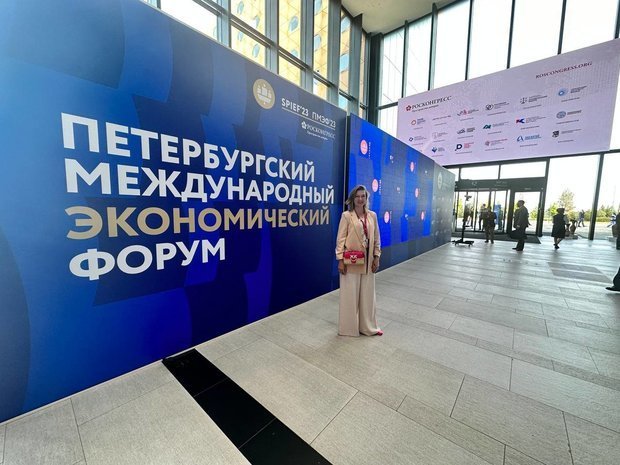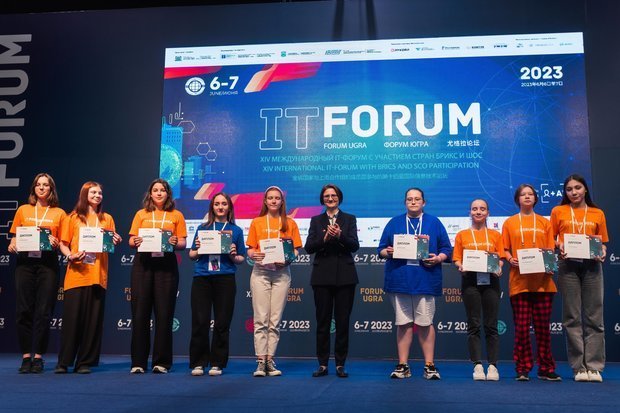Galina Akhmerova: ‘Russian women are distinguished by a high level of economic activity’
Expert: demand for women's labour is growing in the Russian labour market

According to a number of studies, companies whose top management consists of a significant part of women become the most successful in the market. Many experts are also convinced that when solving the labour issue, Russian employers should bet on the fairer sex. “Russian women are distinguished by a high level of education and economic activity," says Galina Akhmerova, the founder of the Darwin Foundation for the Development of Accessibility of Modern Education and the creator of Round platform. In the author's column for Realnoe Vremya, the expert discusses why the demand for women's labour in the country will only grow.
Women will help solve the labour issue
Russia needs more than one million people in the next 5 years to ensure technological sovereignty, Deputy Prime Minister Tatyana Golikova said during SPIEF 2023. “These are the most conservative estimates. Everything will depend on how Russia develops in the technological sectors that are identified as priority," she stressed.
On the one hand, the figure does not look large-scale, if not for one thing.
The Russian Federation has almost exhausted its labour resource: only 2,4 million people are unemployed, which is about 3% in percentage terms and is a historical minimum.
I have already written about one potential source of personnel — young people (from the age of 14, students and employees without experience), whose involvement in labour activity is now actively addressed by companies and the state. From the latter, for example, intern students will have the opportuntiy to work as intern doctors due to a shortage of personnel. In this way, the Ministry of Healthcare plans to partially solve personnel problems in the healthcare sector. As of 2022, the country lacks more than 26 thousand doctors and more than 58 thousand specialists with secondary medical education.
The second category, which should be thoroughly looked at — women (including those who are on maternity leave or do not want to go full-time, in connection with taking care of the family separately — I wrote about them).
The government is already closely engaged in this issue: there is already enough evidence of this. Never before at the SPIEF (as well as at the Russia — Islamic World: KazanForum International Economic Forum), there has been such a number of sessions dedicated to the involvement of women in science, engineering, business and the like.

At the plenary discussion of SPIEF 2023, Vladimir Putin promised to keep child benefits for up to one and a half years even when returning to work (thereby stimulating part-time employment of mothers on maternity leave) — even this can attract tens of thousands of women to the labour market.
In total, there are about 2,5 million mothers with children of this age in Russia now, and there are fewer working among them than among those who have not given birth or have older children. Now the Ministry of Labor, on behalf of the government, is preparing a whole package of measures to involve them in the labour market in addition to the already adopted National Action Strategy for Women.
“High leadership and, at the same time, socially-oriented qualities of women are obvious”
I would also like to tell you a little more about this strategy. The National Strategy of Action for Women for 2023-2030 was approved by the decree of the Government of the Russian Federation dated December 29, 2022.
This document remained little-noticed in the media, and it contains very interesting figures and facts (paying attention to which, employers, I think, will make adjustments to their HR strategies).
According to the Federal State Statistics Service, at the beginning of 2022, 145,6 million people lived in Russia, 77,9 million of them were women. This is more than 50% of the country's population.
Russian women are distinguished by a high level of education and economic activity. More than half of the citizens with higher education are women (55%). At the same time, in 2021, the share of employed women in the total number of employed population was 48,6%.
About 30% of organisations that are small and medium-sized businesses are headed by women. The largest representation of women entrepreneurs is typical for the sphere of social and educational services (by the way, I am also in this category). The share of women's entrepreneurship in the social sphere reaches 90%, in the service sector — 58%.
Women make up 40% of the self-employed.

Over the past 5 years, the proportion of women holding civil service positions in the central offices of federal government bodies has increased by 2,5 percentage points.
The share of women in senior positions in the central offices of federal government bodies has increased by 5,3 percentage points and is almost 40% of the total number of managers.
The high leadership and, at the same time, socially-oriented qualities of women are obvious. Here, to confirm the statistics, I would cite another extremely interesting observation by Alyona Vladimirskaya (one of the most famous career consultants in Russia):
“There has been a sharp increase in interest in female top managers in Russia.
- How was it 5-7 years ago? We need top managers. We don't consider women.
- How was it 3-4 years ago? We need top managers. We consider women, but prefer men.
- How is it now? We need top managers. Preferably a woman.
At first, I associated this effect with mobilisation — the fear that you will lose a top unexpectedly. But so do companies that have deferments. I started talking to shareholders (I talked to four who have just such a request to us now). They name other reasons. I quote further.
- “You look at a 35-year-old top manager. And he has fear in his eyes — he is now afraid of the future. He doesn't understand at all what will happen to his career in a year, in three. Especially if the man worked in an international company. Why do I need a top manager who is afraid or does not believe in the future of the country? How is he going to run a business here? But if you look into a woman's eyes, there is no such fear there. There is a story about home, about family, about the Motherland. This is important now.”
- “It's not hard skills that are more important now, but soft skills. One value system. The cohesion of people. A woman feels it better. And she cements the team better.”
- “Man, he's about a big victory. About exit, about IPO, about capturing a huge market. But the woman is about the history of small daily steps, small daily victories. Now we need to focus on this.”
“It's more about working to remove barriers and breaking down stereotypes”
I myself really like working with female managers, I even learned to find a balance with maternity leaves.

I would like to mention a few more points from the National Strategy of Action for Women for 2023-2030. The implementation of the direction “Increasing the role of women in the development of society, improving their quality of life” involves solving the following tasks:
- formation of motivation among girls and women in educational organisations, including vocational education organisations, motivation to master technical and technological professions and specialties, as well as to work in their profession, specialty;
- creation of conditions for identifying and developing the talents of girls and women;
- formation and dissemination of programmes to improve the digital and financial literacy of women and girls, including in the field of investments;
I would not like to somehow divide talents into male and female. It's more about working to remove barriers and breaking down stereotypes. For example, that only men work in IT, this has long been untrue. We should help women who want to link their careers with IT and digital sphere.
In Ugra, as part of the XIV International IT Forum with the participation of the BRICS and SCO countries, for example, we implemented the IT Leaders project for girls with the support of the Eurasian Association of Women Leaders. More than 50 contestants from nine regions of Russia took part in the project, ten of them came to Khanty-Mansiysk after the online selection round to undergo training and present their projects to the deputy governor of Ugra, Elena Shumakova.

The young women were offered digital projects to solve a particular social problem in the fields of healthcare, sports and culture. In the laboratory, the contestants, together with game technicians, refined the ideas to full-fledged projects. The deputy head of the region welcomed the participants and wished them further development and new achievements. It should be noted that by the results of the full-time selection, women mentors were appointed to the girls, with the support of whom, during the school year, the finalists will implement their projects in schools and conduct educational activities, as well as participate in events for the development of digital and social projects.
This is one of the examples of how in real life a strategy can be put into practice and form communities of female leaders in the IT field, involving girls in the technological sphere for effective communication and expanding the network of professional contacts between female leaders and the younger generation.
I hope that a similar continuity will gradually penetrate into other areas.
Reference
The author's opinion may not coincide with the position of the editorial board of Realnoe Vremya.